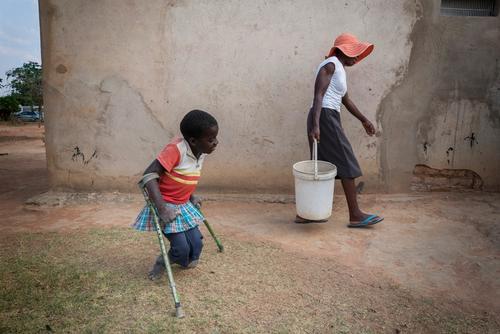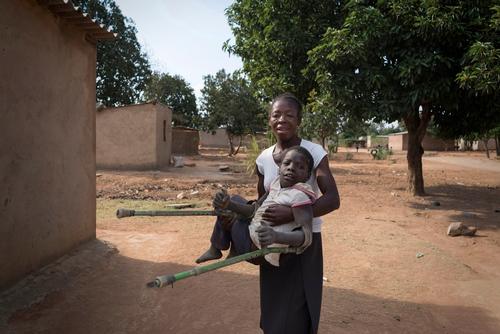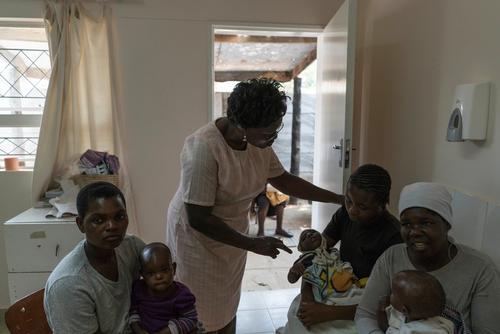It’s 8am and Alice Otiato is walking through the grounds of Epworth clinic in the bright morning sun, smiling as she greets patients and staff with a “How are you?”. It’s already close to 30 degrees and Alice’s day at work has only just begun.
She stops at the day clinic where sick patients are assessed, and quickly scans the room. Her eyes fix on a baby, only a few months old, hanging listlessly over her mother's shoulder. Alice can see this child is seriously unwell, and asks the nurse on duty where the ambulance is. The nurse responds that it has not yet been dispatched as they await confirmation the US$20 cost will be covered by the health authorities. It may only take another 20 minutes, but with the mother unable to pay the fee, and a life hanging in the balance, every second counts.
Alice is quick to react, reassuring the nurse that MSF will pay the fee on arrival. The nurse promptly calls the hospital. Within ten minutes, the ambulance arrives, taking the sick child to the central hospital for urgent treatment.
The situation is critical, but this day is not much different to most days for Alice, who is MSF’s Project Coordinator at the Epworth clinic on Harare’s outskirts.
“My typical day at Epworth, it’s a busy day. You never know what’s going to come up. We have a cohort of over 11,000 patients, so on average we see 350 to 400 patients. All of them are different patients: you have children coming in who are HIV positive, you have mothers and fathers, you have adolescents, so it is a mixed bag,” Alice says as she motions at the large gathering of patients sitting in chairs in the outside waiting area, in the shade and out of the heat. They’re here to pick up their medication, watch the daily TB or HIV education sessions, or see a doctor or nurse.
In 2005, during the Harare City clean-up operation (Murambatsvina), thousands of people were relocated from informal settlements in the city. Around 20,000 settled in Epworth, a former farm, on Harare’s outskirts. In that same year, and due to the growing needs in the area, MSF started providing primary health care in Epworth, in partnership with the Ministry of Health and Child Care (MoHCC).
A year later, the Epworth clinic HIV programme began, after the discovery that Epworth’s HIV rate (30%) exceeded the national average by 6 per cent.

Florence, a 40-year-old mother of four, was the first patient to arrive at the clinic and register in the programme. Florence tested positive for HIV shortly after giving birth to her third child. “I was always sick, and I decided to go and get tested. I had heard there were MSF staff who were doing free tests at the clinic,” she says.
A decade later, Florence is now one of more than 30,000 patients in Zimbabwe who have received free medical care at Epworth clinic. In that time, it has grown from one humble stand-alone building, to a community medical hub. It goes beyond just screening and providing medication, and now runs support groups for TB and HIV patients, houses a pharmacy and meeting rooms and provides counselling sessions.
Florence is a testament to the clinic’s success. Her health has improved and her HIV is under control. She says she’s no longer ashamed of her HIV status.
“Being diagnosed HIV positive doesn’t affect me anymore, although initially it upset me. Now that I have accepted the situation, it hasn’t changed the course of my life,” Florence says as her son runs in and out of the one room house, playing with his neighbours.
With four children of her own, Florence also takes care of her late friend’s disabled ten-year-old daughter, Tanya, who was also diagnosed with HIV.
Tanya and her mother, who passed away in 2010, were part of the first group of patients from the Epworth HIV programme, starting treatment at the clinic on the same day as Florence.
Tanya, her brother, and her father, Life, live next door to Florence. The bubbly young girl, who has never been to school, requires the aid of a wheelchair or crutches to move around.

“Before she started her HIV treatment, you would not imagine she would be the young girl she is now. She was underweight. She was not developing properly. Once she started treatment, her health began to improve,” her father says.
Curious and social, Life says Tanya is desperate to go to school. Tanya spends most days at home with Florence, though, while her Father searches for work. With the unemployment rate estimated to be around 90 per cent, and without a job, Life is unable to pay for Tanya’s education.
“When the other kids are playing outside my home, I try and use my crutches to keep up, but they don’t slow down for me, because I can’t walk as fast,” Tanya says.
Despite the challenges, Tanya remains hopeful about her future. “When I grow up, I want to be a teacher because I want to teach people and help them read. Even though I don’t know how to read, I want to teach them that they should read. At the moment, I can count to ten and I can write ‘my name is Tanya’,” she says, pointing proudly to worn paper on a shelf, scrawled with words and numbers.
MSF has worked at Epworth since November 2006, in partnership with the Ministry of Health and Child Care (MoHCC) at Epworth clinic. In the past ten years, more than 30,000 patients in Zimbabwe have received free medical care at the clinic. Along with providing general health care, the clinic focuses on the treatment of thousands of HIV patients living in and around the community, ensuring they have access to high quality and free medical care.
In the decade since the HIV programme started, HIV prevalence in Zimbabwe has reduced from over 30 per cent at its peak in 2000, to 15 per cent, and today over 1,000 HIV-positive patients have formed support groups in the community (under the CARGs model).



